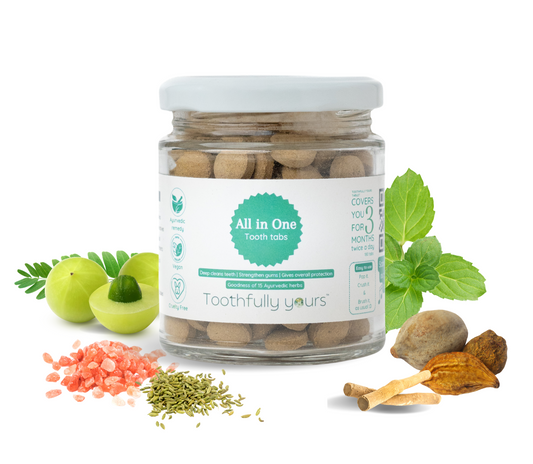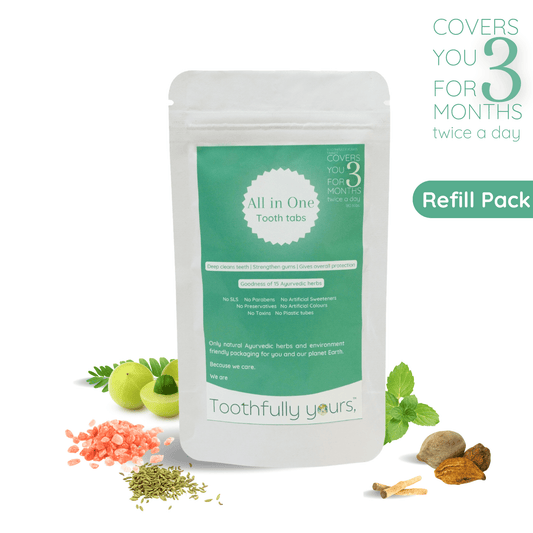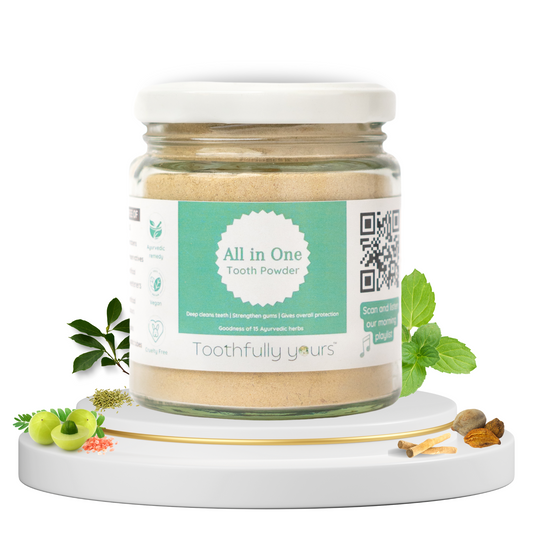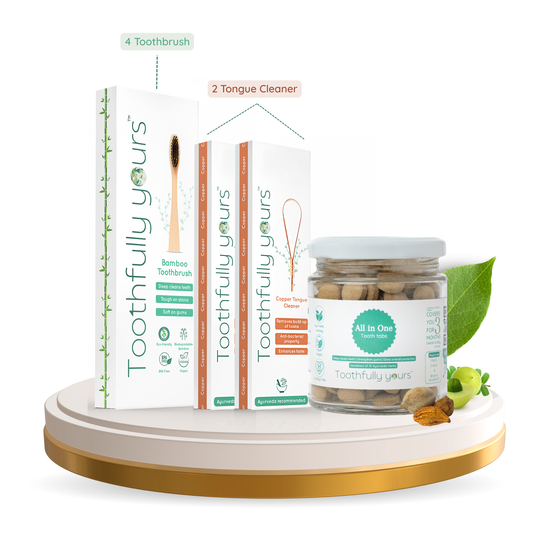
Alcohol-Based Mouthwash: All You Need To Know
In the realm of oral hygiene, mouthwash has become a common fixture in many homes. But as conscious consumers grow more aware of what they’re putting into their bodies, the conversation around alcohol-based mouthwashes is getting louder. Are they effective? Are they safe? And most importantly, are they in harmony with natural wellness?
As a brand rooted in Ayurveda, we believe in aligning modern habits with ancient wisdom. Let’s dive deep into the world of alcohol-based mouthwashes and explore the facts with a mindful lens.
What Is Alcohol-Based Mouthwash?
Alcohol-based mouthwashes typically contain ethanol, a type of alcohol used to kill bacteria and act as a preservative. Many popular over-the-counter mouthwashes boast alcohol contents ranging from 14% to 27%. That’s almost as strong as some liquors!
These mouthwashes are often marketed for their germ-killing power, helping to freshen breath and reduce plaque. However, it’s important to distinguish between the promise and the long-term reality.
Is It Safe to Use Alcohol Mouthwash Every Day?
The safety of daily use largely depends on individual needs and sensitivities. While many dentists consider it generally safe for short-term use, long-term daily use raises concerns. Frequent exposure to high alcohol concentrations may:
-
Disrupt the natural oral microbiome.
-
It causes dry mouth (xerostomia).
-
Lead to increased tooth sensitivity and gum irritation.
-
Exacerbate conditions like ulcers or oral wounds.
From an Ayurvedic perspective, anything that disturbs the natural balance or aggravates “pitta dosha” (associated with heat and inflammation) should be approached with caution. Alcohol, being inherently heating and drying, may disturb this balance when used excessively.
How Does Alcohol-Based Mouthwash Work?
Alcohol-based mouthwash primarily works by denaturing the proteins in bacterial cell walls, effectively killing a broad spectrum of microorganisms in the mouth. This reduces bacterial load and can temporarily improve breath.
However, this isn’t a selective kill. It wipes out both harmful and beneficial bacteria—much like antibiotics in the gut. This indiscriminate action may create an imbalance, potentially weakening your mouth’s natural defense system over time.
Potential Drawbacks & Side Effects of Alcohol-Based Mouthwash
Despite the short-term benefits, alcohol-based mouthwashes come with a list of possible drawbacks:
-
Dry Mouth: Alcohol reduces saliva production, which is essential for neutralizing acids and maintaining healthy oral tissues.
-
Oral Irritation: Users often report a burning sensation on the tongue or inner cheeks, especially with long-term use.
-
Taste Disturbances: Some people find their sense of taste altered after consistent use.
-
Risk of Misuse: In rare but serious cases, mouthwash containing alcohol has been misused for its intoxicating effects, particularly among adolescents.
-
Link to Oral Cancer (Controversial): Some older studies raised concerns about a possible association between alcohol-based mouthwash and oral cancers, though the evidence remains inconclusive.
Alcohol-Based vs. Alcohol-Free Mouthwash: Which One Is Better?
When comparing the two, the choice should be guided by your oral health goals and overall wellness philosophy.
|
Criteria |
Alcohol-Based Mouthwash |
Alcohol-Free Mouthwash |
|
Germ-killing strength |
High |
Moderate to High (depends on formulation) |
|
Oral hydration |
Can cause dryness |
Gentle, non-drying |
|
Irritation risk |
Higher |
Minimal |
|
Compatibility with Ayurveda |
Low |
Higher if herbal or plant-based |
|
Suitable for kids |
No |
Yes (especially herbal ones) |
For those embracing natural wellness, alcohol-free herbal alternatives with ingredients like neem, clove, tulsi, and licorice are far more aligned with holistic oral care.
Expert Recommendations & Alternatives to Alcohol-Based Mouthwash
Dental experts often recommend using mouthwash as a supplementary tool—not a replacement for brushing and flossing. When it comes to natural alternatives, Ayurveda offers a treasure trove of solutions:
-
Oil Pulling: Swishing sesame or coconut oil helps remove toxins and balance oral flora.
-
Herbal Mouth Rinses: Infusions of neem, mint, and triphala can naturally cleanse the mouth.
-
Clove Water: A mild antiseptic and breath freshener, clove water is ideal for everyday use.
These gentle remedies not only support oral hygiene but also promote systemic health by reducing inflammation and balancing doshas.
Choosing The Right Mouthwash
When selecting a mouthwash, consider:
-
Your Sensitivities: Do you have dry mouth, gum issues, or ulcers?
-
Ingredients: Look for botanical ingredients like neem, fennel, cinnamon, or turmeric.
-
Alcohol Content: If you experience burning or dryness, switch to alcohol-free alternatives.
-
Certifications: Choose products that are Ayurvedic-certified or made with organic ingredients.
Remember: What goes in your mouth should be as safe and natural as what goes in your body.
Alcohol-Based Mouthwash FAQs
Can alcohol-based mouthwash kill all bacteria in the mouth?
Yes, but that’s not always a good thing. It kills both harmful and beneficial bacteria, which can disrupt the oral microbiome.
Is alcohol-based mouthwash safe for children?
No. Due to its high alcohol content, it is not recommended for children. Alcohol-free herbal mouthwashes are a safer option.
Does alcohol-based mouthwash cause dry mouth?
Yes, alcohol is a drying agent and can reduce saliva production, which may lead to dry mouth and bad breath over time.
Can alcohol-based mouthwash help with bad breath?
Temporarily, yes. However, if bad breath is caused by dry mouth or imbalanced bacteria, it may actually worsen the issue in the long run.
How often should I use alcohol-based mouthwash?
If you choose to use it, limit use to once a day or as advised by your dentist. However, herbal alternatives can often be used more frequently and safely.
In Conclusion
Alcohol-based mouthwash may offer a quick fix for oral freshness, but its long-term impact raises several red flags—especially when viewed through the lens of natural, holistic health. Ayurveda teaches us that true wellness starts with balance, not brute force.
By embracing gentle, plant-based oral care routines, we not only protect our smiles but also honor the body’s natural intelligence. Choose wisely. Choose nature.





